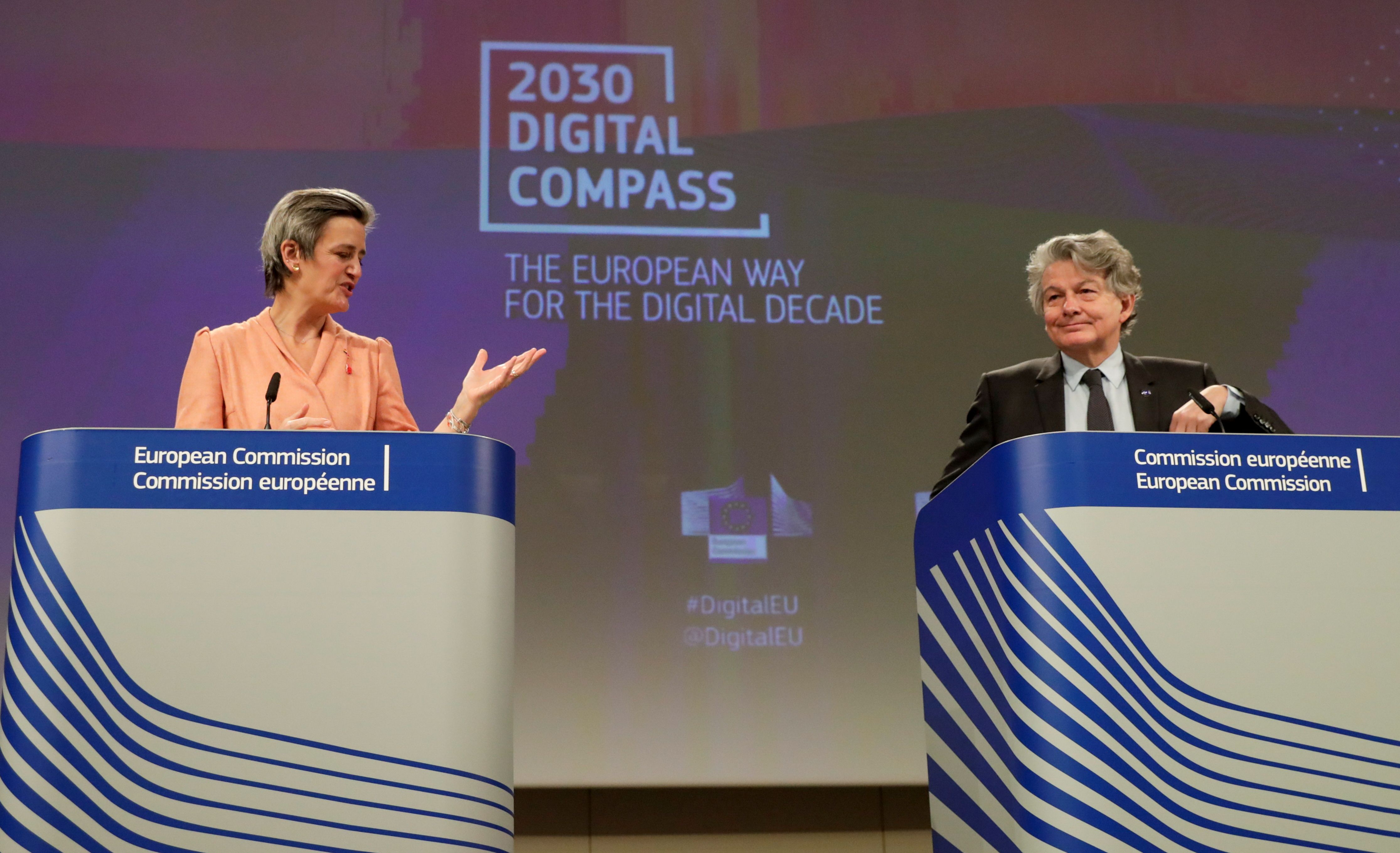The EU’s Digital Decade: Goals and Challenges

Published on 9 March, the Communication from the European Commission (EC) entitled “2030 Digital Compass” was initiated by the European Council. In October last year, the heads of state and government called on the EC to develop measurable goals for the next decade, especially as the ongoing pandemic has accelerated the global digital transformation. Following consultations with the Member States, the European Parliament, and other stakeholders, a detailed Digital Policy Programme is to be developed by the end of 2021. The implementation of the agreed Compass goals will be monitored on a regular basis, and the conclusions of the analysis will be published in Commission reports.
Goals of the Digital Decade
The focus is on four areas: society, infrastructure, business, and public services. The selection of these areas results mainly from the identification of current problems, especially Member States lagging behind the world leaders in the digital transformation. The measurable goals of the transformation are based, among others, on the Index of Digital Economy and Society (DESI), published annually. The EC wants 80% of Europeans (56% now) to have at least basic digital competences, which means, among others, the ability to use a computer and the internet, by 2030. By the end of the decade, the number of specialists in the ICT sector is to increase to 20 million from the current 7.8 million.
The most important infrastructure project is the 5G network, which is to cover all populated areas, and each household should have access to a gigabyte internet connection. The EC also wants to double the EU share by value of the world’s production of semi-conductors (to 20% from the current 10%). Achieving this goal would reduce dependence on the U.S. and China. The increasing competition between the superpowers has already contributed to problems with the availability of microprocessors and integrated circuits around the world. The EU wants to develop projects that will allow companies to reduce their dependence on non-European data-storage service providers. Among the priorities is edge computing, which allows for faster data transfer thanks to the use of “edge nodes”, for example, individual computers or small servers located closer to data-generating facilities (e.g., autonomous cars). The Compass also refers to the EC’s previous announcements about the construction of the first European quantum computer.
In the area of business, the EC wants 75% of European enterprises to use cloud computing, artificial intelligence (AI), or big data by 2030. Also, 90% of small and medium-sized enterprises (SMEs) should achieve at least basic digitisation, up from 61% today (although with a large gap between the leader, Denmark, at 85% and the last, Greece, with 32%; Poland is at 40%).
Among the ambitions of the “digital decade”, which has already accelerated as a result of the COVID-19 pandemic, is digitalisation of public services: 100% of the most important services across the EU are to be digitised (currently, 75% for citizens and 84% for business). In addition, 80% of Europeans should use a digital identity card (eIDAS), which has not yet been introduced.
Means and Tools of the Digital Transformation
Acceleration of the process is to be made through increased financial outlays. The Multiannual Financial Framework (MFF, €1.1 trillion in total) and the Recovery and Resilience Facility (RRF, €672.5 billion) will play a key role. Member States are required to allocate at least 20% of the RRF’s allocated funds to digital projects, which must be reflected in their recovery plans.
Under Horizon Europe, a major MFF research and development programme (€95 billion in total), international and inter-institutional partnerships are to be established in two areas. The first concerns key technologies (e.g., semiconductors), with the funds financing their research and production. The second is partnerships for smart grids and services to support the development of secure 5G networks and the development of 6G technology (to support devices that require even faster data transfer). Another €10 billion from the Horizon Europe programme will contribute to the European Innovation Council, which will have a special fund (€3 billion) to support startups.
In turn, Digital Europe (€7.5 billion) will be the first programme in the EU budget entirely devoted to digital projects. In total, €2.2 billion will go to the work already underway to build a European supercomputer (and quantum computer); €2.1 billion will be allocated to AI, specifically its application in business, the development of European data clouds, as well as greater use of AI in healthcare; $850 million will be invested in developing citizens' digital skills; and 5G infrastructure will be financed, among others, from the Connecting Europe Facility (about €2 billion).
The EU intends to weave the goals of the digital decade into foreign policy. Cooperation with the United States through the Trade and Technology Council could set transatlantic standards on the development of new technologies and lead to a joint strategy on securing value chains, including those for semiconductors. The EU is also considering the creation of a Digital Communications Fund in the form of grants to neighbouring countries.
Challenges to the Implementation of the Digital Compass
More than €130 billion for the digital transformation will go directly to the Member States in the form of loans and non-repayable grants. The challenge will be to effectively use these funds in the short term (projects are to be approved by 2023) in a way that allows achieving economies of scale, which means increasing the potential of actions at the pan-European level. This is especially true of the digitisation of European enterprises, but also of public services such as electronic patient cards and European digital identities.
Another challenge will be levelling the achievements across all regions of the EU. The annual DESI report, which uses a points system, reveals still large differences between the countries: the highest-ranked Finland (72 points) is twice as high as Bulgaria (36 points), the last in the EU (Poland is 23rd with 45 points). Moreover, in the areas of digital competences or infrastructure there is a significant difference between urban and rural areas.
A further challenge lies in the billions for research projects and their implementation, mainly under the Horizon Europe programme. The large amount of funds may deepen the existing differences between the scientific and technological potentials of individual countries. An estimated 95% of the funds from the Horizon 2020 research programme implemented in the previous budget were allocated to entities in the “old fifteen” (those that were EU members before 2004).
Conclusions
The financial resources and strategies included in the 2030 Digital Compass can be used to accelerate the economic transformation. The most easily achievable goals, and at the same time, most necessary are those to increase the digital competences of citizens, ensure wide access to high-quality ICT infrastructure for households and businesses, and the popularisation of the digitisation of public services. The ongoing COVID-19 pandemic has accelerated the expected changes in the functioning of economies, requiring a higher level of digitisation of European enterprises and societies.
According to the plan outlined in the Compass, the annual report by the European Commission on the state of implementation of the goals of the European Digital Decade will be an integral part of the European Semester. Member States will therefore receive a number of recommendations based on their degree of achievement of the targets. Given the close link between the Compass and DESI, it is important that countries align their national digital reconstruction plans to their results in this index. For Poland, the areas requiring the greatest improvement are the use of internet services (by citizens and business) and the integration of digital solutions in the economy (including cloud computing and AI).


